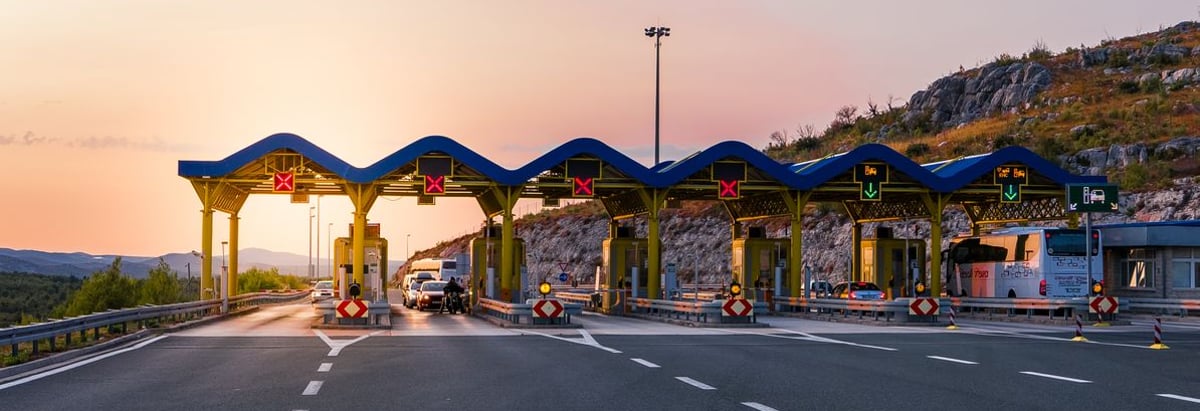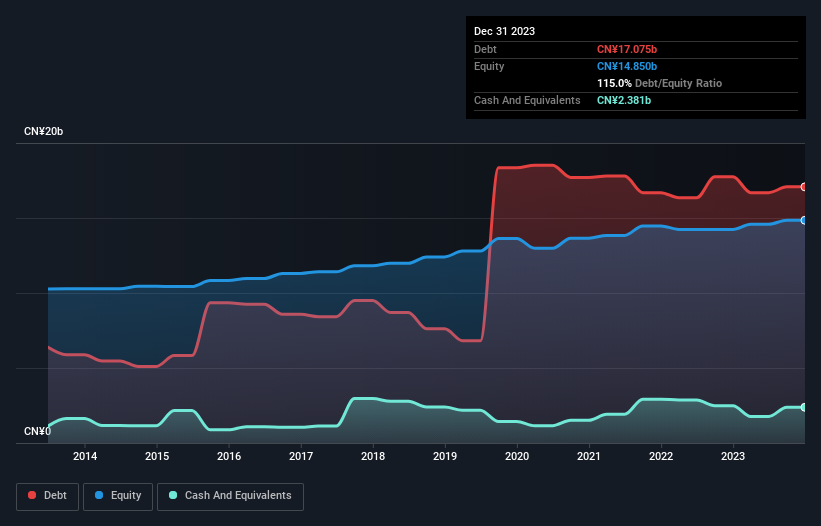- Hong Kong
- /
- Infrastructure
- /
- SEHK:1052
Yuexiu Transport Infrastructure (HKG:1052) Has A Somewhat Strained Balance Sheet

The external fund manager backed by Berkshire Hathaway's Charlie Munger, Li Lu, makes no bones about it when he says 'The biggest investment risk is not the volatility of prices, but whether you will suffer a permanent loss of capital.' It's only natural to consider a company's balance sheet when you examine how risky it is, since debt is often involved when a business collapses. Importantly, Yuexiu Transport Infrastructure Limited (HKG:1052) does carry debt. But the real question is whether this debt is making the company risky.
Why Does Debt Bring Risk?
Debt is a tool to help businesses grow, but if a business is incapable of paying off its lenders, then it exists at their mercy. In the worst case scenario, a company can go bankrupt if it cannot pay its creditors. However, a more usual (but still expensive) situation is where a company must dilute shareholders at a cheap share price simply to get debt under control. Of course, debt can be an important tool in businesses, particularly capital heavy businesses. When we examine debt levels, we first consider both cash and debt levels, together.
Check out our latest analysis for Yuexiu Transport Infrastructure
What Is Yuexiu Transport Infrastructure's Net Debt?
As you can see below, Yuexiu Transport Infrastructure had CN¥17.1b of debt, at December 2023, which is about the same as the year before. You can click the chart for greater detail. However, it also had CN¥2.38b in cash, and so its net debt is CN¥14.7b.

How Strong Is Yuexiu Transport Infrastructure's Balance Sheet?
We can see from the most recent balance sheet that Yuexiu Transport Infrastructure had liabilities of CN¥7.83b falling due within a year, and liabilities of CN¥13.8b due beyond that. On the other hand, it had cash of CN¥2.38b and CN¥253.8m worth of receivables due within a year. So it has liabilities totalling CN¥19.0b more than its cash and near-term receivables, combined.
The deficiency here weighs heavily on the CN¥6.39b company itself, as if a child were struggling under the weight of an enormous back-pack full of books, his sports gear, and a trumpet. So we'd watch its balance sheet closely, without a doubt. After all, Yuexiu Transport Infrastructure would likely require a major re-capitalisation if it had to pay its creditors today.
We use two main ratios to inform us about debt levels relative to earnings. The first is net debt divided by earnings before interest, tax, depreciation, and amortization (EBITDA), while the second is how many times its earnings before interest and tax (EBIT) covers its interest expense (or its interest cover, for short). Thus we consider debt relative to earnings both with and without depreciation and amortization expenses.
Yuexiu Transport Infrastructure has a debt to EBITDA ratio of 4.6 and its EBIT covered its interest expense 3.6 times. Taken together this implies that, while we wouldn't want to see debt levels rise, we think it can handle its current leverage. Looking on the bright side, Yuexiu Transport Infrastructure boosted its EBIT by a silky 34% in the last year. Like the milk of human kindness that sort of growth increases resilience, making the company more capable of managing debt. The balance sheet is clearly the area to focus on when you are analysing debt. But it is future earnings, more than anything, that will determine Yuexiu Transport Infrastructure's ability to maintain a healthy balance sheet going forward. So if you want to see what the professionals think, you might find this free report on analyst profit forecasts to be interesting.
Finally, a company can only pay off debt with cold hard cash, not accounting profits. So we always check how much of that EBIT is translated into free cash flow. Happily for any shareholders, Yuexiu Transport Infrastructure actually produced more free cash flow than EBIT over the last three years. That sort of strong cash generation warms our hearts like a puppy in a bumblebee suit.
Our View
We feel some trepidation about Yuexiu Transport Infrastructure's difficulty level of total liabilities, but we've got positives to focus on, too. For example, its conversion of EBIT to free cash flow and EBIT growth rate give us some confidence in its ability to manage its debt. It's also worth noting that Yuexiu Transport Infrastructure is in the Infrastructure industry, which is often considered to be quite defensive. We think that Yuexiu Transport Infrastructure's debt does make it a bit risky, after considering the aforementioned data points together. Not all risk is bad, as it can boost share price returns if it pays off, but this debt risk is worth keeping in mind. There's no doubt that we learn most about debt from the balance sheet. But ultimately, every company can contain risks that exist outside of the balance sheet. For example Yuexiu Transport Infrastructure has 2 warning signs (and 1 which is a bit unpleasant) we think you should know about.
If, after all that, you're more interested in a fast growing company with a rock-solid balance sheet, then check out our list of net cash growth stocks without delay.
If you're looking to trade Yuexiu Transport Infrastructure, open an account with the lowest-cost platform trusted by professionals, Interactive Brokers.
With clients in over 200 countries and territories, and access to 160 markets, IBKR lets you trade stocks, options, futures, forex, bonds and funds from a single integrated account.
Enjoy no hidden fees, no account minimums, and FX conversion rates as low as 0.03%, far better than what most brokers offer.
Sponsored ContentNew: Manage All Your Stock Portfolios in One Place
We've created the ultimate portfolio companion for stock investors, and it's free.
• Connect an unlimited number of Portfolios and see your total in one currency
• Be alerted to new Warning Signs or Risks via email or mobile
• Track the Fair Value of your stocks
Have feedback on this article? Concerned about the content? Get in touch with us directly. Alternatively, email editorial-team (at) simplywallst.com.
This article by Simply Wall St is general in nature. We provide commentary based on historical data and analyst forecasts only using an unbiased methodology and our articles are not intended to be financial advice. It does not constitute a recommendation to buy or sell any stock, and does not take account of your objectives, or your financial situation. We aim to bring you long-term focused analysis driven by fundamental data. Note that our analysis may not factor in the latest price-sensitive company announcements or qualitative material. Simply Wall St has no position in any stocks mentioned.
About SEHK:1052
Yuexiu Transport Infrastructure
Invests in, constructs, develops, operates, and manages expressways and bridges in the People’s Republic of China.
Good value average dividend payer.
Market Insights
Community Narratives



